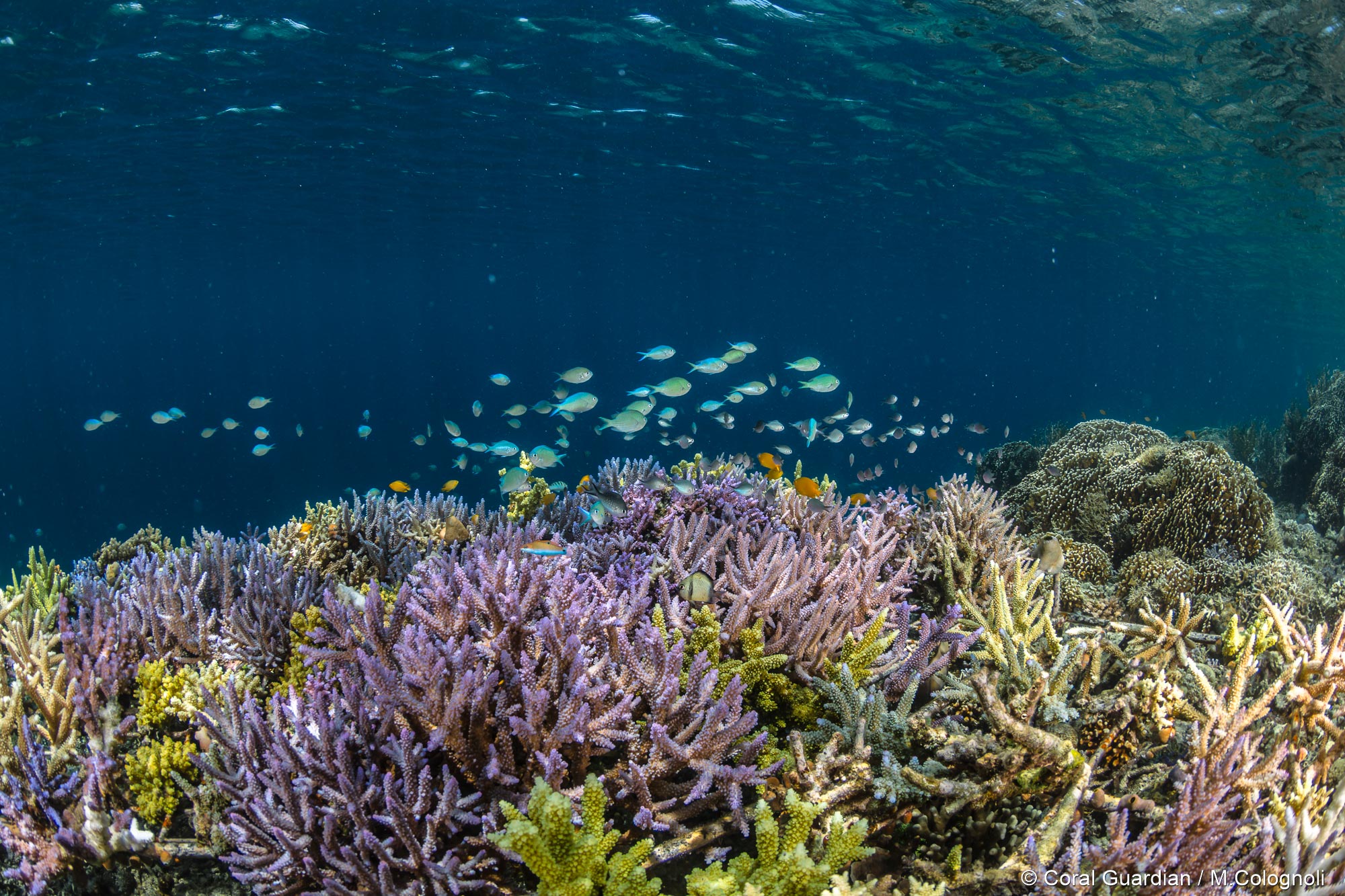The IPCC recommends coral restoration

Rising ocean temperatures
Oceans take up 71% of the surface of the Earth. They are essential to climate regulation because of their exchange with the atmosphere.
30% of CO2 emitted by human activities is absorbed by oceans. This absorption takes place through biological and chemical processes.
The more carbon emissions we have, the more atmospheric emissions increase due to the release of gases into the atmosphere. The more CO2 there is in the atmosphere, the greater the need for its dissolution in the ocean.
Excess heat is absorbed by the ocean, allowing the atmosphere to ‘warm up less’. The ocean, meanwhile, increases in temperature. Researchers estimated that in 2017, oceans reached the warmest point in comparison with the climatology control period (1981-2010), (Figure 1). This increase is 600 times higher than the energy generated by China in 2016 (Cheng et al., 2018). This warming has serious consequences for the rise in sea levels, decreasing marine oxygenation, melting ice, ocean acidification and the loss of coral reefs. The more the oceans warm up the more they lose their ability to dissolve the carbon from the atmosphere, and the more the Earth’s temperature will increase.

Figure 1 : Temperature change in the upper ocean surface since 1958. The conductive line refers to 1981-2010.
Source : Cheng, L., & Zhu, J. (2018). 2017 was the Warmest Year on Record for the Global Ocean, 34 (March), 261–263.
What is the impact on coral reefs?
The Intergovernmental Panel on Climate Change (IPCC), has published a report “Special Report, Global Warming of 1.5 °C” to answer questions about this goal. They also worked on a new report “Special Report on the Ocean and the Cryosphere in the Context of Climate Change,” which, for the first time, highlights the importance and emergency to act for oceans.
Global warming depends on future emissions, but also on past ones. At present, we have reached a 1°C warming since the industrial revolution, which suggests that by 2040 we will reach 1.5°C (Figure 2).

Figure 2 : Forecast global temperature change based on observations made until 2017.
Source : IPCC “Special Report, Global Warming by 1.5 °C”
According to the IPCC, with this trend, weather events will be more and more frequent and more and more serious.
The frequency of marine heat waves has doubled since 1982. By reaching 2°C warming (Paris Agreement, 2015), they would be even more frequent, leading to severe disruption in coral ecosystems.
The IPCC report is severe on coral reefs. Indeed, a 70% to 90% extinction is predicted if temperatures increase by 1.5°C compared to 99% if they increase by 2°C. This decline in coral reefs would be due, amongst other things, to ocean acidification and rising ocean temperatures. The diversity of coral species would be drastically affected (increase in algal populations and soft corals), with serious consequences for the services they provide, especially dietary services. Many people will be forced to radically change their way of life.
A little hope…
However, some scientists have noticed a thermal adaptation of coral reefs of 0.4°C per decade, but also a recovery of impacted areas between 5 and 15 years (Baker et al., 2008, Schleussner et al., 2016b). Coral reef resilience has already been mentioned, following the successive bleaching events in 2016 and 2017.
Mesophotic corals also attract the attention of scientists because of their ability to grow in deep waters, thus preventing them from increasing surface water temperatures. However, their assistance in ‘surface coral reef restoration’, remains limited (Bongaerts et al., 2017).
According to the IPCC, the options for coral reef adaptation to these changes involve the protection and restoration of damaged areas on which humans depend on for economic activities and coastal protection. Reef protection from unrelated stress such as pollution or overfishing is mandatory. The preservation of coral reefs’ biodiversity is also very important, and ensures the sustainability of these ecosystems. Reef restoration is a growing field, and many questions remain today. But one thing is certain: coral reefs of tomorrow will not be the same as today.
The faster the changes, the less time species have to adapt, and the more ecosystems will suffer. It is therefore essential to try and stabilise global warming by drastically reducing CO2 emissions. According to the IPCC report, the trajectory we are taking today would lead to a thermal increase of 3-4°C by 2100.
According to the IPCC, a drastic and global reduction of greenhouse gas emissions, as well as the protection and restoration of marine ecosystems, would allow us to preserve oceans. Thus, any form of life on Earth will be protected, according to Debra Roberts, co-chair of IPCC working group II.
The report published by the IPCC, provides access to all available scientific knowledge so that governments and local communities can act and limit climate impacts. The future of resilience depends, above all, on raising awareness amongst populations based on the scientific and local knowledge of ecosystems.
It becomes more than urgent to act now! In order to limit emissions, adaptation efforts will have to take place on a global, national and local scale.


